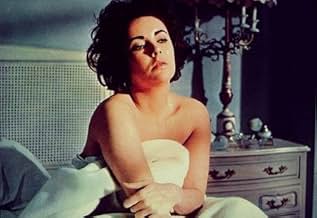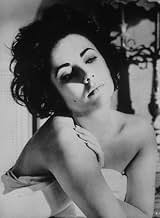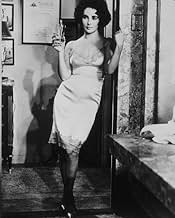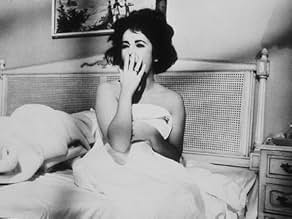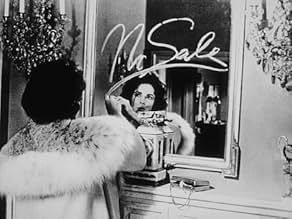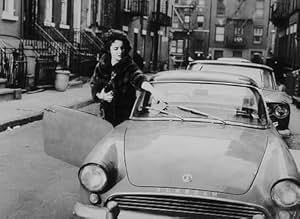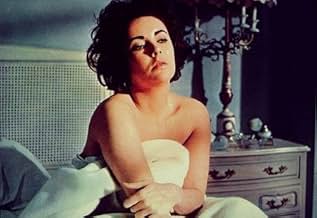NOTE IMDb
6,3/10
7,8 k
MA NOTE
Une call-girl de Manhattan a une liaison tragique avec un riche homme marié.Une call-girl de Manhattan a une liaison tragique avec un riche homme marié.Une call-girl de Manhattan a une liaison tragique avec un riche homme marié.
- Réalisation
- Scénario
- Casting principal
- Récompensé par 1 Oscar
- 1 victoire et 6 nominations au total
Tom Ahearne
- Tom the Bartender
- (non crédité)
John Armstrong
- Doorman
- (non crédité)
Dan Bergin
- Elevator Man
- (non crédité)
Joseph Boley
- Messenger
- (non crédité)
Don Burns
- Photographer
- (non crédité)
Whitfield Connor
- Anderson
- (non crédité)
Avis à la une
`The most desirable girl in town is the easiest to find. Just call Butterfield-8!' So trumpeted the posters of this, Elizabeth Taylor's first Oscar winning performance. The film is a modernization of the 1935 novel by John O'Hara, which was based on the real life of the 1920's New York City call girl Starr Faithful.
Miss Taylor was dead set against playing Gloria Wandrous. She felt was a deliberate play by M.G.M. to capitalize on her recent notoriety in the Liz-Eddie-Debbie scandal. Also, she was anxious to move on to her first ever million-dollar role in Fox's Cleopatra. She was told by M.G.M that if she did not fulfill her contractual obligation to her home studio for one final film on her eighteen year contract that she would be kept off the screen for two years and miss making Cleopatra all together. She swore to the producer Pandro S. Berman that she would not learn her lines, not be prepared and in fact not give anything more and a walk through. Mr. Berman knew her better than she suspected. In the end Elizabeth Taylor turned in a professional, classic old style Hollywood performance that ranks at the top with the best of her work. She brings a savage rage to live to her searing portrait of a lost girl soaked through with sex and gin. A woman hoping against all hope to find salvation in yet one last man. Weston Leggett, a man who is worse off than she is in the self-esteem department. In her frantic quest for a clean new life Gloria finds that the male establishment will not allow her to step out of her role as a high priced party girl. She is pigeon holed by her past and the narrow mores of the late 50's are not about to let her fly free. Not the bar-buzzards of Wall Street, not her best friend Steve who abandons her at his girlfriend's insistence. Not even her shrink Dr. Treadman believes in her. The three women in her life are blind to who she really is. Her mother will not admit what Gloria has become. Mrs. Thurber will not believe she can ever change and Happy, the motel proprietor is too self involved in her own past to care who Gloria is She is the dark Holly Golightly and this is the lurid red jelled Metro-Color Manhattan that is the flip side of Billy Wilder's The Apartment (also 1960). Wilder's New York is cynical. Liz's tony East Side phone exchange rings only one way, the hard way. This New York is dammed. Recrimination and death are Gloria's final tricks, and she goes out in a melodramatic blaze that Douglas Sirk might have envied in place of his usually unsettling, unconvincing happy endings. In the end we have a bravura performance by the last true star of the old system. Yes she deserved the Oscar more for `Cat'. Yes it was given to welcome her back from the brink of death in London. And even Shirley MacLaine's lament on Oscar night, `I lost the Oscar to a tracheotomy.' can not diminish this must see performance by Miss Taylor.
In what one could call a perfect example of what an `Oscar scene' is all about she says it all. `I loved it! Every awful moment of it I loved. That's your Gloria, Steve. That's your precious Gloria!' She gave it to us with both barrels blazing, and Metro, and Berman be dammed.
Miss Taylor was dead set against playing Gloria Wandrous. She felt was a deliberate play by M.G.M. to capitalize on her recent notoriety in the Liz-Eddie-Debbie scandal. Also, she was anxious to move on to her first ever million-dollar role in Fox's Cleopatra. She was told by M.G.M that if she did not fulfill her contractual obligation to her home studio for one final film on her eighteen year contract that she would be kept off the screen for two years and miss making Cleopatra all together. She swore to the producer Pandro S. Berman that she would not learn her lines, not be prepared and in fact not give anything more and a walk through. Mr. Berman knew her better than she suspected. In the end Elizabeth Taylor turned in a professional, classic old style Hollywood performance that ranks at the top with the best of her work. She brings a savage rage to live to her searing portrait of a lost girl soaked through with sex and gin. A woman hoping against all hope to find salvation in yet one last man. Weston Leggett, a man who is worse off than she is in the self-esteem department. In her frantic quest for a clean new life Gloria finds that the male establishment will not allow her to step out of her role as a high priced party girl. She is pigeon holed by her past and the narrow mores of the late 50's are not about to let her fly free. Not the bar-buzzards of Wall Street, not her best friend Steve who abandons her at his girlfriend's insistence. Not even her shrink Dr. Treadman believes in her. The three women in her life are blind to who she really is. Her mother will not admit what Gloria has become. Mrs. Thurber will not believe she can ever change and Happy, the motel proprietor is too self involved in her own past to care who Gloria is She is the dark Holly Golightly and this is the lurid red jelled Metro-Color Manhattan that is the flip side of Billy Wilder's The Apartment (also 1960). Wilder's New York is cynical. Liz's tony East Side phone exchange rings only one way, the hard way. This New York is dammed. Recrimination and death are Gloria's final tricks, and she goes out in a melodramatic blaze that Douglas Sirk might have envied in place of his usually unsettling, unconvincing happy endings. In the end we have a bravura performance by the last true star of the old system. Yes she deserved the Oscar more for `Cat'. Yes it was given to welcome her back from the brink of death in London. And even Shirley MacLaine's lament on Oscar night, `I lost the Oscar to a tracheotomy.' can not diminish this must see performance by Miss Taylor.
In what one could call a perfect example of what an `Oscar scene' is all about she says it all. `I loved it! Every awful moment of it I loved. That's your Gloria, Steve. That's your precious Gloria!' She gave it to us with both barrels blazing, and Metro, and Berman be dammed.
For any movie fan who loves Elizabeth Taylor, a slick, glossy movie with high 50's-early 60's production values, sharp writing, dramatic moments, and a superb supporting cast of wonderful characters, Butterfield 8 is the movie to watch. Ms. Taylor simply shines in and dominates this glamourous, but ultimately tragic drama. In spite of Ms. Taylor's negative feelings regarding this film, and even her own performance, she is marvelous because her acting makes her character a three dimentional, highly believeable, and ulimately tragical woman.
Simply stated, the movie is fun. The only real problem with this film is Eddie Fisher's wooden performance. David Janson, the original choice for the Fisher role, would have given a far better performance. In fact, he would have been as perfect for this role, as all of the other members of the fine cast of this truly entertaining movie.
Simply stated, the movie is fun. The only real problem with this film is Eddie Fisher's wooden performance. David Janson, the original choice for the Fisher role, would have given a far better performance. In fact, he would have been as perfect for this role, as all of the other members of the fine cast of this truly entertaining movie.
Two beautiful unhappy people from opposite ends of Eisenhower era America are drawn together by an obsessive love that ends in tragic consequences. Elizabeth Taylor won a Best Actress Oscar (after much better performances in earlier pictures such as `Cat On A Hot Tin Roof') for her portrayal of (shock!) call-girl Gloria Wandrous. Laurence Harvey plays the john, Weston Liggett, trapped in a stale marriage with his stoic wife Emily (Dina Merrill, perfect as a blue-blooded blonde heiress).
Complementing the moody performances of Liz and Laurence Harvey are an excellent Eddie Fisher as Gloria's long-suffering best friend and greatest admirer Steve, Mildred Dunnock as poor Mrs. Wandrous, in complete denial of her daughter's easy virtue, Betty Field as nosy neighbor Mrs. Fanny Barber, and many others including Kay Medford as tragicomic motel matron, Happy.
Lurking behind the scenes of `Butterfield 8' are some very grown up issues (particularly for its day) about infidelity, high class prostitution, childhood sexual abuse, and the meaning of true commitment. The dialogue by John Michael Hayes (`Peyton Place,' `To Catch A Thief,' and `Rear Window", among many credits) and Charles Schnee, is punchy and quick, and the movie glows with luscious cinematography from Hollywood veteran Joseph Ruttenberg, who got an Academy Award nomination for his efforts (he had previously won four Oscars dating back to 1938).
Although somewhat dated, it remains a thoughtful film (if you pay attention) and a visual treat for any Liz fan. Worth watching!
Complementing the moody performances of Liz and Laurence Harvey are an excellent Eddie Fisher as Gloria's long-suffering best friend and greatest admirer Steve, Mildred Dunnock as poor Mrs. Wandrous, in complete denial of her daughter's easy virtue, Betty Field as nosy neighbor Mrs. Fanny Barber, and many others including Kay Medford as tragicomic motel matron, Happy.
Lurking behind the scenes of `Butterfield 8' are some very grown up issues (particularly for its day) about infidelity, high class prostitution, childhood sexual abuse, and the meaning of true commitment. The dialogue by John Michael Hayes (`Peyton Place,' `To Catch A Thief,' and `Rear Window", among many credits) and Charles Schnee, is punchy and quick, and the movie glows with luscious cinematography from Hollywood veteran Joseph Ruttenberg, who got an Academy Award nomination for his efforts (he had previously won four Oscars dating back to 1938).
Although somewhat dated, it remains a thoughtful film (if you pay attention) and a visual treat for any Liz fan. Worth watching!
... and just a few years away from the production code being dumped altogether it seems like a demonstration of what was the worst about the code years combined with films in the 60s trying to use what shock value they could get away with, and today , overall, it just looks cheesy.
In most summaries of this film I see Elizabeth Taylor's character, Gloria, described as a call girl. I never really see that happening. Instead Gloria just seems to like sex a lot. As in lots of sex with lots of men. Maybe to come out and say that when the goal of all women was still supposed to be having dishpan hands was going too far.
Gloria wakes up one morning in the apartment of wealthy but married playboy Weston Liggitt (Laurence Harvey), with him having left behind a note with $250 asking "Is this enough". She writes "no sale" in the mirror and takes a mink coat she finds in the closet - only to teach the guy a lesson for assuming she is for sale, but as they get more involved and do so immediately, she forgets all about that coat, and that causes a huge misunderstanding down the line.
The title comes from Gloria's answering service which is "Butterfield 8", and it is the subject of some - today - howlingly unintentionally funny scenes as Liggitt pleads with these people to find Gloria, curses at these people because they don't know where Gloria is, thanks them when they do find her. Gee, fellow, these are just operators eking out a living. They don't know their clients and they don't know you!
With Liz' husband at the time, Eddie Fisher, as a musician who has been Gloria's platonic friend since childhood and who also has a jealous girlfriend who oddly enough looks like Debbie Reynolds. There are some great location shots on the road between New York and Boston with the little independent diners and hotels that once dotted that landscape. I'd mildly recommend it.
An aside - Jeffrey Lynn, once strangely promoted as a romantic leading man over at Warner Brothers just before WWII, does a good job in a small role as Liggitt's friend.
In most summaries of this film I see Elizabeth Taylor's character, Gloria, described as a call girl. I never really see that happening. Instead Gloria just seems to like sex a lot. As in lots of sex with lots of men. Maybe to come out and say that when the goal of all women was still supposed to be having dishpan hands was going too far.
Gloria wakes up one morning in the apartment of wealthy but married playboy Weston Liggitt (Laurence Harvey), with him having left behind a note with $250 asking "Is this enough". She writes "no sale" in the mirror and takes a mink coat she finds in the closet - only to teach the guy a lesson for assuming she is for sale, but as they get more involved and do so immediately, she forgets all about that coat, and that causes a huge misunderstanding down the line.
The title comes from Gloria's answering service which is "Butterfield 8", and it is the subject of some - today - howlingly unintentionally funny scenes as Liggitt pleads with these people to find Gloria, curses at these people because they don't know where Gloria is, thanks them when they do find her. Gee, fellow, these are just operators eking out a living. They don't know their clients and they don't know you!
With Liz' husband at the time, Eddie Fisher, as a musician who has been Gloria's platonic friend since childhood and who also has a jealous girlfriend who oddly enough looks like Debbie Reynolds. There are some great location shots on the road between New York and Boston with the little independent diners and hotels that once dotted that landscape. I'd mildly recommend it.
An aside - Jeffrey Lynn, once strangely promoted as a romantic leading man over at Warner Brothers just before WWII, does a good job in a small role as Liggitt's friend.
As a lad I well remember in 1960 Elizabeth Taylor's struggle for her life with a deadly form of pneumonia. The news which usually when it talked about Liz Taylor it was usually about her various amours. this was different, the whole world was watching the bulletins as they came from London where she was in hospital. It was touch and go, but she made it.
Because she made it, she got an Oscar for Best Actress in 1960 for BUtterfield 8. It was not an award she highly prized. While she was filming BUtterfield 8 she cracked to the press loud and often about what a trashy film it was. She did it because she had only one more film to do on her commitment to MGM and MGM had this property kicking around for decades.
BUtterfield 8 was a novel by John O'Hara about a high priced call girl named Gloria Wandrous. It was based on the infamous Starr Faithful who was killed in 1931 and had a black book of some very influential clients.
Though it was written in 1935 the film is updated to the present. Taylor has a tempestuous relationship with her number one client played by Lawrence Harvey. He's the problem with the film. He's basically a cad, so much of one that one wonders what Taylor saw in him other than a successful social marriage. She certainly has some twisted values and finds that out too late.
Taylor got Eddie Fisher cast in the film as her friend. This was Fisher's second attempt at a movie career and there were no further offers from Hollywood for his services. As an actor he was a dud, Taylor says he doubled in that department as husband. She was quoted as saying that while she could think of good qualities in most of the men she was involved with, she couldn't for the life of her understand why she married Eddie Fisher.
But more than that, to me it was obvious that Fisher's character is gay, despite him having a girl friend played by Susan Oliver. Back then that was one area Hollywood didn't go into.
So Liz got her Oscar at last more for her courageous battle with pneumonia than her performance. She sure did better work. Her second Oscar for Who's Afraid of Virginia Woolf was one she really felt she earned. She was not on screen again until 1963 when Cleopatra was released. And that's a whole other chapter in the Elizabeth Taylor saga.
Because she made it, she got an Oscar for Best Actress in 1960 for BUtterfield 8. It was not an award she highly prized. While she was filming BUtterfield 8 she cracked to the press loud and often about what a trashy film it was. She did it because she had only one more film to do on her commitment to MGM and MGM had this property kicking around for decades.
BUtterfield 8 was a novel by John O'Hara about a high priced call girl named Gloria Wandrous. It was based on the infamous Starr Faithful who was killed in 1931 and had a black book of some very influential clients.
Though it was written in 1935 the film is updated to the present. Taylor has a tempestuous relationship with her number one client played by Lawrence Harvey. He's the problem with the film. He's basically a cad, so much of one that one wonders what Taylor saw in him other than a successful social marriage. She certainly has some twisted values and finds that out too late.
Taylor got Eddie Fisher cast in the film as her friend. This was Fisher's second attempt at a movie career and there were no further offers from Hollywood for his services. As an actor he was a dud, Taylor says he doubled in that department as husband. She was quoted as saying that while she could think of good qualities in most of the men she was involved with, she couldn't for the life of her understand why she married Eddie Fisher.
But more than that, to me it was obvious that Fisher's character is gay, despite him having a girl friend played by Susan Oliver. Back then that was one area Hollywood didn't go into.
So Liz got her Oscar at last more for her courageous battle with pneumonia than her performance. She sure did better work. Her second Oscar for Who's Afraid of Virginia Woolf was one she really felt she earned. She was not on screen again until 1963 when Cleopatra was released. And that's a whole other chapter in the Elizabeth Taylor saga.
Le saviez-vous
- AnecdotesDame Elizabeth Taylor and her husband, Mike Todd, had planned for La Chatte sur un toit brûlant (1958) to be her final movie, as she intended to retire from the screen. Todd had made a verbal agreement about this with MGM, but after his death, MGM forced Taylor to make this movie in order to fulfill the terms of her studio contract. As a result, Taylor refused to speak to director Daniel Mann for the entire production and hated this movie.
- GaffesA crew member's arm is visible in the mirror when Liggett stands before it and is supposedly alone.
- Citations
Tom, the Bartender: Without her this place is dead. She's like catnip to every cat in town.
- ConnexionsEdited into Voskovec & Werich - paralelní osudy (2012)
Meilleurs choix
Connectez-vous pour évaluer et suivre la liste de favoris afin de recevoir des recommandations personnalisées
Détails
- Date de sortie
- Pays d’origine
- Site officiel
- Langue
- Aussi connu sous le nom de
- La Vénus au vison
- Lieux de tournage
- Tappan Zee Bridge, Tarrytown, New York, États-Unis(when Gloria flees Liggett at the end)
- Société de production
- Voir plus de crédits d'entreprise sur IMDbPro
Box-office
- Budget
- 2 800 000 $US (estimé)
- Montant brut mondial
- 8 722 $US
- Durée
- 1h 49min(109 min)
- Couleur
- Rapport de forme
- 2.35 : 1
Contribuer à cette page
Suggérer une modification ou ajouter du contenu manquant


